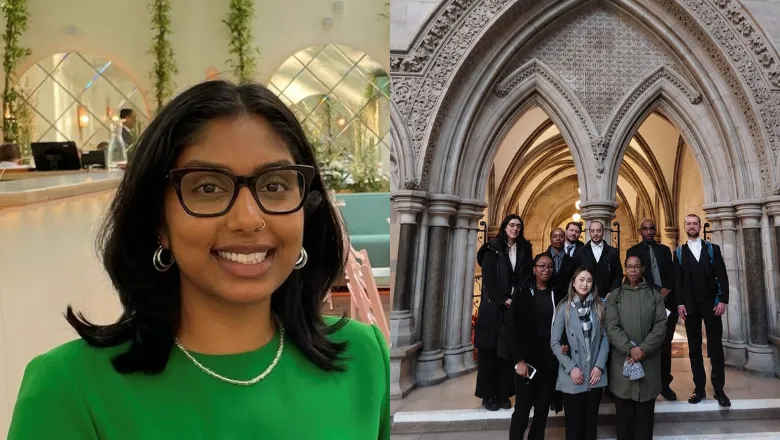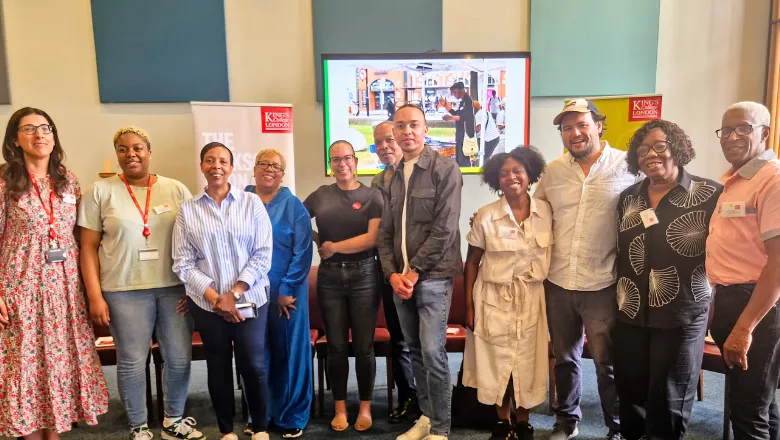This Black History Month, Law student Sharessa Naidoo shares how empathy drives her work with the Windrush Justice Clinic.

When Sharessa Naidoo joined King's last year, she never imagined her legal studies would bring her on stage in front of influential members of the Home Office. Yet this summer, she found herself acting alongside professionals in The Promise, an immersive play designed to give audiences a glimpse into the bureaucratic hurdles and emotional strain faced by victims of the Home Office-Windrush Scandal.
It was a long way from her upbringing in post-apartheid South Africa, but for Sharessa, the tragedy of the Windrush generation felt deeply familiar. Her ancestors had travelled from South India to South Africa as indentured labourers, later subjected to the systemic oppression of apartheid. Growing up, she often struggled to feel like she belonged. "English, Art and History gave me the tools to understand this struggle," she recalls, "and realise it's not my fault that people treated me differently."
That recognition is what drew her to the Windrush Justice Clinic (WJC), a collaborative partnership between King's Legal Clinic and Southwark Law Centre (SLC) to provide Windrush victims with legal representation as well as carrying out research
The Windrush Generation
Between the 1940s and 1970s, thousands of Caribbean migrants were invited to the UK to help rebuild the country after the Second World War. Named after the ship that brought the workers to Britain in 1948, they came to be known as the Windrush Generation.
Promised the right to live and work in Britain, many built their lives and families here. Decades later, immigration policies introduced in 2012 wrongly categorised some members of this generation and their descendants as "illegal migrants". Many of these individuals lost their jobs, homes and access to healthcare, in what became known as the Home-Office Windrush Scandal.
The government set up the Windrush Compensation Scheme in response, but King's research has found it is failing to deliver fair and accessible compensation to victims, due to a range of factors including the way it was set up and a lack of funded legal advice. Shaila Pal, Director and a Supervising Solicitor at King's Legal Clinic, has warned that many such schemes are "exacerbating the harm already suffered" by victims. Only 22% of applications to the Windrush Compensation Scheme have been successful, compared to 79% of those made to the Lambeth Children's Home Redress Scheme and 73% of applications to the Horizon Shortfall Scheme.
For Sharessa and all those working with the WJC, these figures are not abstract - they are visible in the reality faced by clients she meets at the clinic.

Sharessa's personal motivation
"Systemic racism, such as the Windrush Scandal, makes those negatively impacted feel inherently inferior when they are not," she reflects. "Since seeing the power of having the means to express myself and to resist unfair systems, I became personally motivated to be involved in work that empowers individuals with these capabilities to rise above discrimination. I am so grateful for my time at the WJC, which has not only been full of support for me from staff, but has also consistently centred clients' needs".
At WJC, King's students work with Southwark Law Centre to help prepare compensation claims and support with the wider challenges clients are facing, however challenging their circumstances. For example, if a client is made homeless from being wrongly denied lawful immigration status, solicitors help them submit vital applications while simultaneously navigating housing arrangements. This work is tough, requiring not just legal skill but patience and perseverance. Many clients arrive wary and guarded, shaped by years of neglect or mistreatment by service providers, so winning their trust is crucial.
One client, who wanted "money not for themselves, but to set up a trust for their grandchildren" after suffering years of destitution, left a lasting impression on Sharessa.
The impact of the Windrush Justice Clinic is boundless. They provide the means to mend family relationships, break the unjust poverty cycle and treat clients with the attentiveness they deserve.
Sharessa Naidoo, postgraduate student in the Dickson Poon School of Law
Challenging traditional forms of advocacy
This year, the WJC sought fresh ways to spark wider public action by funding playwrights to create an immersive play, The Promise, which built on their research findings and was developed using experiences shared by survivors and victims of the scandal. The play asked audiences to act as advocates or relatives of those affected by the scandal, facing simulated administrative hurdles and highlighting the emotional stress faced by so many.
Sharessa initially helped behind the scenes, recreating legal documents and sharing her experiences of working with clients. But soon she found herself performing in front of packed audiences. "Before I realised, I had a full-fledged acting role in the play as an office worker alongside two other King's students".
The production was as challenging for performers as it was moving for those watching, which included wider members of the public, victims of the scandal and a range of stakeholders. "Some attendees left with tears in their eyes," she recalls. Even policymakers were struck - the Head of the Windrush Compensation Scheme attended a performance and suggested all Home Office employees should experience it.
For Sharessa, the play demonstrated the power of innovative advocacy.
Unlike other scandals, the Windrush injustice has fewer groups pushing for change. This shows how important it is for the Windrush Justice Clinic to keep creating pressure and opening space for systemic reform.
Sharessa Naidoo, postgraduate student in the Dickson Poon School of Law
Black History Month 2025
The theme for Black History Month (BHM) 2025 is "Standing Firm in Power and Pride", which celebrates the resilience and strength of Black communities across the world and highlights the immense contribution Black people have made to progress. You can find more information on the BHM website.






